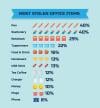Workplace Friendships and Socialising with Colleagues: Findings From our Survey
There are two schools of thought when it comes to friends in the workplace. To some, it’s a place where you spend 40 hours of your week, completing the work you’re set before heading home to live off the fruits of that work. To others, the workplace is more than just arriving at work and sitting in your office chair all day. Blending professional and personal lives can see you spending more of your time with colleagues outside of office hours.
How many of the workforce opt for a personal connection to their workplace? To find out, we asked 2,000 UK employees what they think about friendships in the office and the possible benefits of having mates in the workplace.
Friends At Work
To the majority of the UK workforce, colleagues are much more than just people you happen to share the same carpet with for 40 hours a week. More than three-quarters of those we asked in our survey (76%) said they had what they consider to be close friends in the office. Over a third (36%) said that their best friend works in the same office as them too. To display that friendship, plenty of employees head out after hours to socialise with their fellow colleagues. Company-organised social events are now commonplace. From monthly socials and nights out to the annual Christmas party, organisations who want to bring their employees closer together must do their bit to encourage friendships whenever they can. The stats suggest that most are doing exactly that. 43% socialise outside of normal working hours every month, with almost a quarter (25%) spending some quality time with colleagues every fortnight.A Way to Boost Mental Health
Our research shows how many of us have forged office friendships and socialise with colleagues outside of the normal working environment. But what benefits do individual employees, and entire organisations, gain from their workforce being closer together? How does the increase in morale that friendships bring affect how employees work and what they think about the organisation? We asked respondents what impact their workplace friendships have on their professional and personal lives. We found a positive correlation between office friendships and many wellbeing and business-related factors. More than six in ten people agreed that having workplace friendships improves their happiness (67%) and contributes to good mental health (69%). That healthy mentality feeds into their career outlook, as evidenced by the contribution workplace friendships make to job satisfaction (66% agreed) and motivation at work (63%). They also have an impact on the day-to-day; 61% said that office friendships contributed to improved productivity in the workplace. For business owners, improvements in these areas are directly linked to the bottom line. The Centre for Mental Health estimates the cost of mental health issues at work to be £34.9 billion, as complications hit productivity and attendance. If job satisfaction decreases to a level that pushes talent away from your company, businesses incur recruitment costs to replace them. According to accountancy firm Accounts and Legal, the cost of replacing an employee to SMEs is £12,000 (for an employee earning £27,000 a year). Whatever the real figure, the loss of revenue in lack of output and recruitment costs is undeniable.The Value of Office Friendships
To some, the strength of their office friendships means they are willing to overlook problems in their role. 38% said they’d stay in a role they otherwise didn’t like due to friendships they’d forged in said role, outlining the true value of office friendships. We also asked respondents how far they’d go to protect the friends they have in the office, with plenty of workers happy to cover for their buddies. 29% said they’d complete work that wasn’t theirs, with 12% saying they’d take the blame for a mistake that wasn’t theirs. For one in ten in the workplace, they’d go as far as lying to their manager. Whilst lying to management and hiding the failings of other staff is far from ideal, these are positive signs of a culture of togetherness. Workplaces that don’t encourage such a culture risk their employees turning on one another, breeding a more toxic atmosphere in the process.A Growing Trend
The research also looked at how different generations view the subject of workplace friendships. In almost every data point discussed so far, Generation Z (those aged 18-21) were found to have higher percentages. 87% of Generation Z said they have close friends at work, 11 percentage points higher than the national average and 26 more than the oldest generation we surveyed, 53-71 year-old Baby Boomers (61%). They also socialise with their colleagues more frequently than any other generations, with well over half (57%) heading out at least once a month. The youngest working generation puts a higher value on their office friendships. They are the most likely to stay in a role they don’t like based on those friendships (47%), and it plays a huge role in selecting their next role. 58% said they consider how easily they will be able to make friends at a company when considering a job offer – 10 percentage points higher than the UK average.For Some, They’re Just Colleagues
Despite the majority appreciating the benefits of workplace friendships, there are times when we all just want to duck out of that after-work drink. While 26% of respondents said they had no intention of socialising with colleagues, two-thirds (66%) said that in the past they’d done something to avoid socialising with colleagues. The most popular methods for avoiding socialising with colleagues were:- Pretended to have other plans - 39%
- Intentionally made other plans - 17%
- Said they could not organise childcare - 14%
- Faked an illness - 14%
- Pulled a sicky off work - 10%
- Faked a family emergency – 10%









